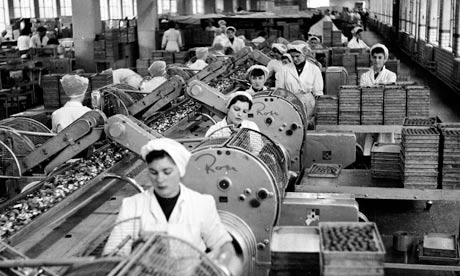Cadbury accused of 'highly aggressive' tax avoidance schemes
Chocolate maker allegedly paid £6.4m tax a year in decade before it was sold to Kraft, despite annual profits of £100m

Cadbury’s alleged tax fudge went 'against the reputation of the company', a former executive was reported as saying. Photograph: Graham Turner for the Guardian
Cadbury, the British chocolate maker that triggered a national outcry when it was sold to US food company Kraft in 2010, was running aggressive tax avoidance schemes a decade before the takeover,according to a report in the Financial Times.
It paid an average of £6.4m tax a year in the decade before it was sold, despite annual profits of £100m, the paper said.
Cadbury's tax avoidance schemes were described as highly aggressive by an unnamed former executive interviewed by the FT, who said it "goes against what you would think about the reputation of the company from its philanthropic background".
The cocoa and drinking chocolate business was founded in 1824 by a Quaker philanthropist, evolving to become a beloved British brand known for Dairy Milk, Wispa and Curly Wurly bars.
 Some of the 4,300 women employed at the Cadbury factory in Bournville, in February 1954. The cocoa and drinking chocolate business was founded in 1824 by a Quaker philanthropist. Photograph: Haywood Magee/Getty Images
Some of the 4,300 women employed at the Cadbury factory in Bournville, in February 1954. The cocoa and drinking chocolate business was founded in 1824 by a Quaker philanthropist. Photograph: Haywood Magee/Getty Images
The £12bn takeover of the company by Kraft in 2010 was debated in the House of Commons, with MPs warning that the sale would slash the tax take for the Treasury. But long before the deal, Cadbury was reportedly concocting complex schemes that shuffled money around subsidiaries. These included an arrangement, codenamed Chaffinch, that knocked £17m off its tax bill between 2006-08.
Another successful ploy between 1998-2002 involved sheltering £400m in the Cayman Islands, wiping £9m from its tax bill in one year alone. The company also used the more conventional avoidance strategy of loading its business with debt in high-tax countries and financing growth in low-tax countries such as Ireland.
The revelations come after David Cameron and other G8 leaders pledged to close loopholes and stop companies shifting their profits overseas. In a recent Guardian interview the prime minister promised to crack down on "secretive companies in secretive locations" that cost treasuries billions of pounds in lost revenue.
Referring to the allegations, Mondelez, the new name for Kraft, said: "The FT article relates to a period from 1997-2010 when Cadbury Schweppes PLC and Cadbury PLC were entirely independent businesses. It would therefore be inappropriate for us to comment."
No comments:
Post a Comment